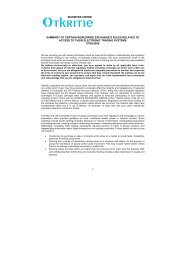OSL Terms of Business for Professional Clients and ... - Otkritie
OSL Terms of Business for Professional Clients and ... - Otkritie
OSL Terms of Business for Professional Clients and ... - Otkritie
Create successful ePaper yourself
Turn your PDF publications into a flip-book with our unique Google optimized e-Paper software.
<strong>Otkritie</strong> Securities Limited<br />
<strong>Terms</strong> <strong>of</strong> <strong>Business</strong> For Pr<strong>of</strong>essional <strong>Clients</strong><br />
<strong>and</strong> Eligible Counterparties<br />
APPENDIX 1. RISKS DISCLOSURE<br />
You should note that there are significant risks inherent in investing in certain financial instruments <strong>and</strong> in<br />
certain markets. Investment in derivatives, futures, options <strong>and</strong> warrants may expose you to risks which are<br />
different to those investors might expect when they invest in equities. Similarly, investment in shares issued by<br />
issuers in emerging markets (by which we mean those that have an underdeveloped infrastructure or which<br />
are less economically or politically stable as markets in developed countries) involves risks not typically<br />
associated with equities investment in well developed markets. Investment in any <strong>of</strong> the <strong>for</strong>egoing kinds <strong>of</strong><br />
financial instruments is generally appropriate <strong>for</strong> sophisticated investors who underst<strong>and</strong> <strong>and</strong> are able to bear<br />
the risks involved. Among such risks, is the risk <strong>of</strong> losing the entire value <strong>of</strong> an investment or (in the case <strong>of</strong><br />
certain derivative <strong>and</strong> other Transactions) the risk <strong>of</strong> being exposed to liability over <strong>and</strong> above the initial<br />
investment. We set out below some specific risks <strong>and</strong> considerations <strong>for</strong> investors in relation to financial<br />
instruments <strong>of</strong> the type referred to above. This in<strong>for</strong>mation is not intended to constitute a comprehensive<br />
statement <strong>of</strong> all the risks to which investors might be exposed <strong>and</strong> there may be others that exist now or which<br />
may arise in the future.<br />
Stabilisation<br />
You may enter Transactions in newly issued securities in respect <strong>of</strong> which we are the stabilisation manager<br />
<strong>and</strong> the price <strong>of</strong> which may have been influenced by measures taken to stabilise it. Stabilisation enables the<br />
market price <strong>of</strong> a security to be maintained artificially during the period when a new issue <strong>of</strong> securities is sold to<br />
the public. Stabilisation may affect not only the price <strong>of</strong> the new issue but also the price <strong>of</strong> other securities<br />
relating to it. The FSA allows stabilisation in order to help counter the fact that when a new issue comes onto<br />
the market <strong>for</strong> the first time, the price can sometimes drop <strong>for</strong> a time be<strong>for</strong>e buyers are found. As long as the<br />
stabilisation manager follows FSA rules, it is entitled to buy back the securities that were previously sold to<br />
investors or allotted to institutions which have decided not to keep them. The effect <strong>of</strong> this may be to keep the<br />
price at a higher level than it would otherwise be during the period <strong>of</strong> stabilisation. The stabilisation rules:<br />
(a) limit the period when a stabilisation manager may stabilise a new issue;<br />
(b) fix the price at which the issue may be stabilised (in the case <strong>of</strong> shares <strong>and</strong> warrants, but not bonds); <strong>and</strong><br />
(c) require disclosure <strong>of</strong> the fact that a stabilisation manager may be stabilising but not that it is actually doing<br />
so.<br />
The fact that a new issue is or a related security is being stabilised should not be taken as any indication <strong>of</strong> the<br />
level <strong>of</strong> interest from investors, nor <strong>of</strong> the price at which they are prepared to buy the securities.<br />
Foreign Currency <strong>and</strong> Exchange Rates<br />
Foreign markets will involve different risks from the UK markets. In some cases the risks will be greater.<br />
Investments in <strong>for</strong>eign securities may expose investors to the risk <strong>of</strong> exchange rate fluctuation <strong>and</strong> investors<br />
who deposit collateral denominated in one currency may be subject to margin calls in circumstances where the<br />
obligations secured by such collateral are denominated in another currency (in addition to the risk <strong>of</strong> margin<br />
calls <strong>for</strong> fluctuations in relative values). Some currencies are not freely convertible <strong>and</strong> restrictions may be<br />
placed on the conversion <strong>and</strong>/or repatriation <strong>of</strong> investors’ funds including any pr<strong>of</strong>its or dividends.<br />
Emerging Markets<br />
Investors should be aware that there may be potential risks posed by volatile political, legal <strong>and</strong> commercial<br />
conditions in emerging markets which may affect the value <strong>of</strong> or result in the loss <strong>of</strong> investments. The quality<br />
<strong>and</strong> reliability <strong>of</strong> <strong>of</strong>ficial data published by governments <strong>and</strong> their agencies in emerging markets might not be<br />
equivalent to that available in developed markets. In addition, the absence <strong>of</strong> developed securities markets as<br />
well as potentially underdeveloped banking <strong>and</strong> telecommunications systems in such countries may give rise<br />
to greater custody, settlement, clearing <strong>and</strong> registration risks. Foreign investment in issuers in emerging<br />
markets may be restricted – sometimes such restrictions may not be published <strong>and</strong> investors may not be<br />
readily made aware <strong>of</strong> them. In such circumstances, there may be restrictions on repatriation <strong>of</strong> capital or an<br />
investment may have to be scaled down to comply with local <strong>for</strong>eign ownership restrictions.<br />
35



